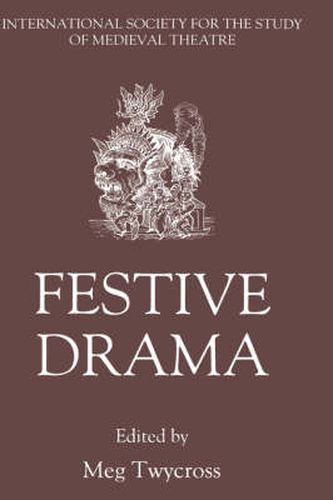Readings Newsletter
Become a Readings Member to make your shopping experience even easier.
Sign in or sign up for free!
You’re not far away from qualifying for FREE standard shipping within Australia
You’ve qualified for FREE standard shipping within Australia
The cart is loading…






Festive drama, in these studies, includes processions and folk-customs as well as full-blown plays, from Spain, the Netherlands, France, Germany, Britain, Denmark, and Bohemia (now the Czech Republic). The main focus is the middle ages, but style and approach are as relevant as time-scale, reflecting a culture in which there are no firm divisions between drama and pageantry and traditional ceremonies. Common themes emerge: the world turned upside-down of Shrovetide; the emotive power of religious celebration; and the links between commerce and the demonstration of civic pride. Festive customs are viewed as hidden agendas of popular culture, and performances are reconstructed. This is the obverse of art and power: the means by which the people, not the princes, rule the world.Professor MEG TWYCROSS teaches at the Department of English at Lancaster University. Other contributors: PETER H. GREENFIELD, OLGA HORNER, SHEILA LINDENBAUM, CLAIRE SPONSLER, RONALD E. SURTZ, RAFAEL PORTILLO, MANUEL J. GOMEZ LARA, PAMELA M. KING, ROBERT POTTER, JOHN CARTWRIGHT, DAVID MILLS, JAMES STOKES, ALAN E. KNIGHT, MARJOKE DE ROOS, FEMKE KRAMER, TOM PETTITT, LEIF SNDERGAARD, WIM HUUSKEN, JEAN-MARC PASTREE, SALLY-BETH MACLEAN, MALCOLM JONES, CHRISTINE RICHARDSON, JARMILA F. VELTRUSKY, JOHN COLDEWEY.
$9.00 standard shipping within Australia
FREE standard shipping within Australia for orders over $100.00
Express & International shipping calculated at checkout
Festive drama, in these studies, includes processions and folk-customs as well as full-blown plays, from Spain, the Netherlands, France, Germany, Britain, Denmark, and Bohemia (now the Czech Republic). The main focus is the middle ages, but style and approach are as relevant as time-scale, reflecting a culture in which there are no firm divisions between drama and pageantry and traditional ceremonies. Common themes emerge: the world turned upside-down of Shrovetide; the emotive power of religious celebration; and the links between commerce and the demonstration of civic pride. Festive customs are viewed as hidden agendas of popular culture, and performances are reconstructed. This is the obverse of art and power: the means by which the people, not the princes, rule the world.Professor MEG TWYCROSS teaches at the Department of English at Lancaster University. Other contributors: PETER H. GREENFIELD, OLGA HORNER, SHEILA LINDENBAUM, CLAIRE SPONSLER, RONALD E. SURTZ, RAFAEL PORTILLO, MANUEL J. GOMEZ LARA, PAMELA M. KING, ROBERT POTTER, JOHN CARTWRIGHT, DAVID MILLS, JAMES STOKES, ALAN E. KNIGHT, MARJOKE DE ROOS, FEMKE KRAMER, TOM PETTITT, LEIF SNDERGAARD, WIM HUUSKEN, JEAN-MARC PASTREE, SALLY-BETH MACLEAN, MALCOLM JONES, CHRISTINE RICHARDSON, JARMILA F. VELTRUSKY, JOHN COLDEWEY.